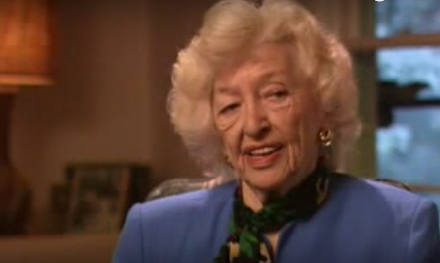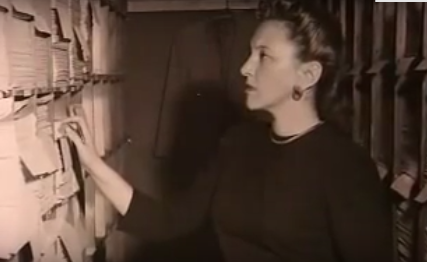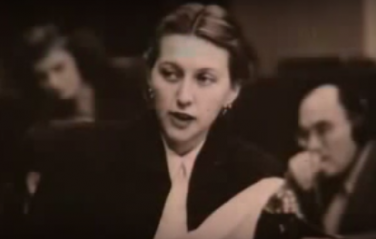Women at Nuremberg: Belle Mayer Zeck

Editor’s Note: USC Shoah Foundation is spotlighting the under-examined efforts of women at the Nuremberg Trials in an eight-part series of stories that each focuses on the contribution of a different woman. The stories were shared earlier this year in a public lecture titled “Women at Nuremberg” by Diane Marie Amann (University of Georgia), who came to work at the USC Shoah Foundation Center for Advanced Genocide Research as a fellow.
 Belle Mayer in the I.G. Farben documents room at the Palace of Justice in Nuremberg, Germany.
Belle Mayer in the I.G. Farben documents room at the Palace of Justice in Nuremberg, Germany.In 1933, after losing an election to President Paul von Hindenburg, Adolf Hitler gave a speech to a small group of German industrialists in the home of Hermann Goering. It was persuasive: Chemical company I.G. Farben donated 500,000 Deutsche Marks to the near-bankrupt Nazi party, essentially breathing life back into it.
For this gift, I.G. Farben became one of the largest wartime government contractors for Nazi Germany. The company not only manufactured synthetic rubber and oil for the war effort, it owned a large stake in a subsidiary that produced Zyklon-B, the gas used to kill Jews en masse via the gas chambers at Auschwitz and other death camps. (I.G. Farben later dissolved into four companies, one of which is the pharmaceutical giant Bayer AG.)
Playing a major role in holding I.G. Farben to account was a lawyer from New York named Belle Mayer, who served as a prosecutor in 1947 and 1948 during the Nuremberg Trials.
“Without I.G. Farben and its tremendous resources – particularly, U.S. dollars, foreign exchange – Hitler simply couldn’t have waged war,” she said in her 1999 interview with USC Shoah Foundation at age 80. “They manufactured over 90 percent of the explosives in Germany. … Every bomb had their signature on it.”
Just after the war, Mayer, a graduate of Syracuse University and Fordham Law School, landed a job in the general counsel’s office of the U.S. Treasury Department. Her office in Washington, D.C. worked in partnership with a group of U.S. infantrymen in Europe who’d raided I.G. Farben headquarters in Frankfurt in the months after the war and left with gunny sacks filled with documents.
These documents made their way to Mayer’s office in D.C., and she and other staff began untangling the complex web of corporate trusts and business names meant to camouflage the ownership of the company.
One day, a man named Bill showed up to her office in the Foreign Funds Control Bureau of the U.S. Treasury. He was a prosecutor at the Nuremberg Trials in Germany and was seeking documents.
 Belle Mayer Zeck during her interview with USC Shoah Foundation.
Belle Mayer Zeck during her interview with USC Shoah Foundation.Bill was so impressed by Mayer’s depth of knowledge that he suggested to his superiors she join the team in Nuremberg. A few months later, she was there, serving as associate counsel to the U.S. prosecution team.
Not long after the trial, Belle Mayer and Bill Zeck would be married. (Zeck also gave a testimony to USC Shoah Foundation.)
Of the 23 men charged at I.G. Farben during the Nuremberg Trials, 13 were found guilty of a range of war crimes that included plundering and spoliation of occupied territories, and large-scale slave labor at concentration camps and elsewhere. Their prison sentences ranged from one-and-a-half to eight years.
In her 1999 interview, Mayer – who died in 2006 at age 87 – explained how her investigation into I.G. Farben’s external assets would develop the case against the company.
“The investigation in the United States led to the identification of various factories and banks and warehouses throughout South America,” Mayer said. “I.G. Farben was like an octopus– it really covered the globe and has establishments and installations in every major city of the world.”
At the trial, Mayer was charged with explaining to the judges what the documents she had uncovered meant. She learned to ignore the objections of the defendants’ lawyers as she presented.
“After a while, I must admit to you, I decided I was never going to get my documents and other things and evidence if I listened to their objections,” Mayer said in her testimony. “I just took my earphones off.”
(Among the documents presented at the trial was one detailing the meeting in which Hitler spoke in Goering’s home.)
 Belle Mayer in court at the I.G. Farben trial in Nuremberg.
Belle Mayer in court at the I.G. Farben trial in Nuremberg. “He said: ‘These people were going to die anyhow and we gave them the blessing of a swift and merciful death,’” Mayer said. “Of course, at the same time, they were burning people’s bodies up and he thought nothing of that.”
He was sentenced to seven years.
Belle and William returned to her hometown of Suffern, N.Y., and raised two children. William would become a State Supreme Court justice. Belle practiced law and became involved in politics. In 1970, she was elected president of the Rockland County Bar Association.
In her testimony, Mayer remembered the desensitization she experienced in her transition from work in Washington to work in Nuremberg: “In Washington, I was absolutely horrified at the revelations that came out of every document. Just appalled at the bestiality of the Nazis. When I got to Nuremberg, though, and as cumulative evidence kept coming in, it was just so staggering. It was a gigantic travesty of moral abominations. I became rather numb.”
Like this article? Get our e-newsletter.
Be the first to learn about new articles and personal stories like the one you've just read.